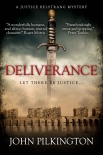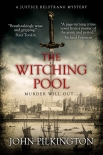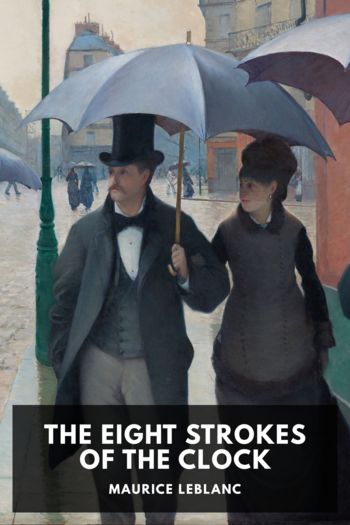Deliverance: A Justice Belstrang Mystery by John Pilkington (top 10 most read books in the world .TXT) 📗

- Author: John Pilkington
Book online «Deliverance: A Justice Belstrang Mystery by John Pilkington (top 10 most read books in the world .TXT) 📗». Author John Pilkington
‘Jonas Willett?’ I stepped forward. ‘Well met… I did not expect to find you here, so far upstream.’
‘Master Pride, is it?’ He came forward, dusting off his hands. He was dripping with sweat, clad in rough clothing and the leather apron common to foundrymen. ‘How can I aid you?’
I told him briefly of my visit to Cricklepit, and of my reception. I was curious to note Willett’s reaction, and was somewhat surprised by the bitter smile that appeared.
‘You’ll get nothing out of Russell,’ he said. ‘Tight as a clam, with a hard shell to match.’
I made no reply, but glanced over to his companion who had not stopped working. Following my gaze, Willet said: ‘That’s my son. We work together, casting small guns for merchantmen down at Bristol… falconets and such. They like to carry their own protection, against pirates.’
‘Just the two of you?’ I said. ‘That must be hard work.’
He gave a shrug. ‘It is, but I’d rather be my own man than serve the Mountfords as I used to.’ A pause, then: ‘Old Sir Richard was a good master, though we saw less of him after John took over…’
He looked away, but it was enough: I seized the moment.
‘I know about the explosion,’ I said. ‘A terrible event… I heard Sir Richard was in anguish over his brother’s death.’
The answer, however, astonished me. When Willett turned to face me again, he was frowning.
‘Explosion?’ He shook his head. ‘Nay, there was none. John Mountford was found in the woods, crushed by a fallen tree.’ And when I showed surprise: ‘He too was a good man… I’m certain Crickepit would be a happier place, had he lived.’
Though eager to speak further, I held back; this was not the time, and he was eager to return to his work. I asked him if we might talk further in The Comfort that evening, when I would stand him a mug or two.
‘You’re a generous man, sir,’ he said, after a pause. ‘And most enquiring… I’ll attend you, if you wish. Though I’ve no desire to speak of the Mountfords – I left their employ soon after Francis started coming here. Do you know him?’
I hesitated, then said that I may have met the man once. To which the foundryman gave a nod, and took his farewell.
But as he walked away, my pulse quickened. There had been no explosion: John Mountford had been killed by a falling tree. It was not unknown, I supposed, for a man to perish in such a manner – and yet, my Belstrang scepticism had possessed me.
In short, I did not believe it.
***
That night at the inn was an unexpected turning point. It would send me further away than I expected, on a trail that would confound me. But I leap ahead in my account, and must tell of my conversation with Jonas Willett and his son, in a quiet corner of The Comfort Inn after supper.
I had not expected young Peter Willett to be there, but I was not displeased. Though at first somewhat guarded, after a while he began to speak with pride of his gun-founding. I was soon being overwhelmed with descriptions of small cannons: minions, which threw a ball of four pounds; falcons, which are three-pounders, and falconets, two-pounders. They were nimble shipboard weapons, cast in good iron, Peter said. The Willetts, it transpired, had no license from the King to supply his army with ordnance. That was the Mountfords’ business, at Crickepit and at their other foundries like Soudley, deeper in the forest.
‘We don’t have the means to make bigger cannon,’ the older Willett said. ‘Culverins, say, with a bore that can take an eighteen-pound shot. Or even demi-culverins. I learned my trade casting those… great heavy things.’
‘I would be interested to watch the process,’ I said, though in truth I was eager to turn to the topic of John Mountford’s death. But I let the conversation flow for a while, plying both father and son with ale until I felt their tongues had loosened enough. The inn was almost full this night, the next day being the Sabbath; the talk was loud, with here and there voices rising in song.
‘It’s a dirty business, gun-founding… hot and perilous,’ Jonas Willett said, before lapsing into silence. It struck me that he was the sort who might grow morose in drink, hence I sought to steer the discourse elsewhere.
‘How do you ship them?’ I enquired. ‘By barge, downriver?’
‘On trows,’ Peter answered. ‘Flat-bottomed sailing boats – you will see them up and down the Severn.’
I might have told him that I was as familiar with Severn trows as he was, since they sailed as far up the river as Worcester and even further – until I remembered that William Pride was supposed to be a Londoner.
‘There’s a pill – that’s what we call creeks here on the Severn. It flows down to Purton on the riverfront,’ Peter went on. ‘That’s where they dock, and we load our gunnery. Mountfords do the same… they have their own boats.’
‘I believe I’ve heard that,’ I said, my mind moving quickly. ‘It was on such a boat that John Mountford’s corpse was sent upriver, to their estate at Upton – am I correct?’
But to that, neither man spoke. They exchanged looks, and lifted their mugs.
‘Your pardon…’ I looked from one to the other. ‘I recall it’s not a matter you like to discuss.’
‘My father has small liking for Francis Mountford – that’s Sir Richard’s son,’ Peter said finally. ‘But John was respected hereabouts… he is greatly missed.’
I glanced at the older man, but he had lapsed into silence.
‘Is Francis here





Comments (0)